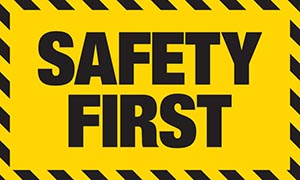
Recently, a couple of people have suggested that vehicle ratings such as GVWR and GCWR are only measures of mechanical ability, not measures of safety.
Here is my official response.
 I do not know what most of you may have been taught, but if you own a tow vehicle built to the specifications required by National Highway Traffic Safety Administration (NHTSA), you may know that ratings such as GVWR, GAWR, GCWR, and TWR are primarily related to safety and vehicle longevity.
I do not know what most of you may have been taught, but if you own a tow vehicle built to the specifications required by National Highway Traffic Safety Administration (NHTSA), you may know that ratings such as GVWR, GAWR, GCWR, and TWR are primarily related to safety and vehicle longevity.
Here are some examples:
The primary U.S. government organization providing manufacturing and safety requirements is NHTSA, and its mission statement is: “Save lives, prevent injuries and reduce economic costs due to road traffic crashes, through education, research, safety standards and enforcement activity.” (Notice that the mission statement does not state “rating standards.”)
NHTSA issues Federal Motor Vehicle Safety Standards (FMVSS) to implement laws from Congress. These regulations allow them to fulfill their mission to prevent and reduce vehicle crashes. Again, this about safety.
NHTSA’s pamphlet, Towing a Trailer, Being Equipped for Safety, mentions safety 23 times.
Here is a quote from the 49 CFR 571 - FEDERAL MOTOR VEHICLE SAFETY STANDARDS: “The purpose of this standard is to ensure safe braking performance under normal and emergency conditions.” It is important to understand that “emergency conditions” are included. When operating a vehicle beyond the safety ratings, an accident or serious injury or death could occur.
The Certification Label located near or on the driver side door requires a statement similar to this: “This vehicle conforms to all applicable Federal motor vehicle safety, bumper, and theft prevention standards in effect on the date of manufacture shown above.”
All vehicle owner’s manuals have rating warnings and cautions directly related to safety.
Many components that make up a vehicle do have failure ratings. However, just about all vehicle safety ratings are below the component failure rating under normal operation. Considering the fact that 60% of all tow vehicles are exceeding at least one safety rating, there is no evidence that tow vehicles have massive mechanical failures. However, continuous operation of a vehicle exceeding the safety ratings may result in premature mechanical failure. Premature mechanical failure is dependent on the amount the component’s rating is exceeded and time.
Some tow vehicle owner's manuals may state: "The towing vehicle's brake system is rated for operation at the GVWR—NOT GCWR. Separate functional brake systems should be used for safe control of towed vehicles and for trailers weighing more than 1,500 lbs. when loaded." A consumer is never expected to own a tow vehicle to have the braking capacity to stop the entire rig (GCWR).
All trailers with brakes have requirements similar to tow vehicles and the trailer brakes are required to safely stop the trailer when it is at the maximum GVWR.
After a thorough study of NHTSA documents, it is apparent that ratings are required to support safety requirements.
(Emphasis added on safety.)
©2011-2025 Fifth Wheel Street and Fifth Wheel St. All Rights Reserved. Use of this website constitutes acceptance of the Privacy Statement and Terms and Conditions of Use.